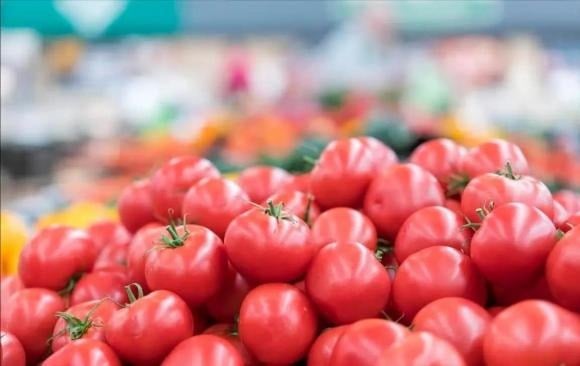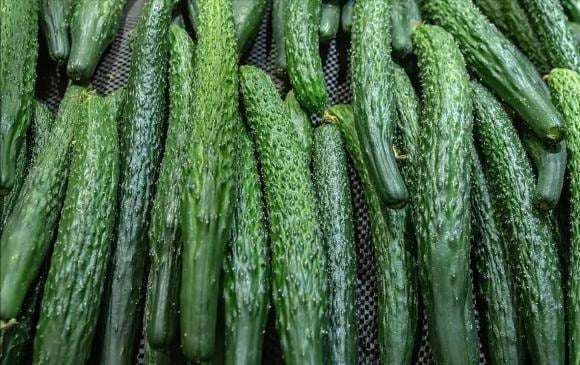1. Off-Season Tomatoes
During winter, be cautious of plump, red tomatoes sold at vegetable markets at a hefty price. According to long-time vegetable vendors, these are mostly off-season tomatoes grown using greenhouse technology, with temperature and light adjustments, to meet market demands.

Be cautious of plump, red tomatoes during winter.
These tomatoes tend to be hard, less juicy, and bland in taste. They may also contain chemicals that are harmful to your health. While this method ensures a supply of tomatoes in winter, the nutritional value and flavor are significantly reduced. Due to the excessive use of chemical fertilizers, pesticides, and growth stimulants, off-season tomatoes pose potential health risks. It’s best to limit or avoid consuming them in winter.
2. Greenhouse Cucumbers
Cucumbers, a popular summer vegetable known for their cooling properties and fresh flavor, are surprisingly easy to find in winter markets. This is largely due to greenhouse cultivation methods. However, the greenhouse environment differs significantly from natural conditions, and farmers often use hormones and preservatives to promote cucumber growth.
These cucumbers have an attractive green color and soft skin, but they lack the characteristic crispness and have an unnatural sweet taste. Prolonged consumption of these cucumbers may have negative health effects. Therefore, opting for seasonal vegetables during winter is a safer and healthier choice.

Cucumbers are typically a summer vegetable but are now easily found in winter markets.
3. Rootless Bean Sprouts
Bean sprouts are a familiar dish on the dining table, renowned for their high nutritional content and appealing crispness. However, during winter, rootless bean sprouts are abundantly sold in markets, causing concern among experienced vegetable vendors. These sprouts, though appearing clean and aesthetically pleasing, are often treated with chemicals such as growth stimulants or root-removing agents.
These chemicals not only disrupt the natural growth process but also leave residues in the sprouts, posing health risks to consumers. Veteran vegetable sellers advise that the tiny roots of natural bean sprouts signify their vitality and safety for consumption. Therefore, when purchasing bean sprouts, it is recommended to prioritize those with roots, even if they may not look as perfect, as they are safer for your health.
4. Frozen Green Leafy Vegetables
In winter, when fresh green leafy vegetables are scarce, many households opt for frozen ones. However, experienced vegetable sellers suggest limiting the consumption of these frozen greens. While some nutrients are retained during the freezing process, the cellular structure of the vegetables is damaged, resulting in a significant loss of natural flavor and aroma.
Additionally, frozen green leafy vegetables are prone to bacterial growth during thawing, increasing the risk of food poisoning if not handled properly. Instead, choose seasonal fresh vegetables like cabbage or water spinach, which may be less convenient but offer superior nutritional value and taste. Prioritizing seasonal fresh produce is the wisest choice for a healthy winter diet.
5. Artificially Ripened Bananas
Bananas, a tropical fruit, are less common in the North during winter. To meet market demands, traders often transport green bananas from the South and use ripening chemicals to accelerate the process. Veteran vegetable sellers reveal that chemically ripened bananas usually have shiny yellow peels but lack the natural sweetness and flavor of organically ripened ones.
Moreover, these chemicals can negatively impact your health, especially for children and the elderly. If you crave bananas in winter, opt for naturally ripened ones, which may have a few spots on the peel but guarantee safety and retain the authentic flavor.
6. Chemically Treated Potatoes
Potatoes are a popular winter staple, offering high nutritional value and versatility in cooking. However, experienced vegetable sellers caution against purchasing potatoes treated with chemicals. Some traders use sprout inhibitors to extend the shelf life and prevent potatoes from sprouting.
While these potatoes may appear smooth and blemish-free, prolonged consumption can be detrimental to your health. When buying potatoes, choose those with natural signs of aging and avoid overly perfect-looking ones to ensure the well-being of yourself and your family.

































